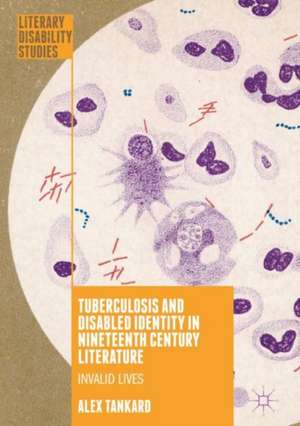Tuberculosis and Disabled Identity in Nineteenth Century Literature: Invalid Lives: Literary Disability Studies
Autor Alex Tankarden Limba Engleză Hardback – 15 feb 2018
| Toate formatele și edițiile | Preț | Express |
|---|---|---|
| Paperback (1) | 692.74 lei 6-8 săpt. | |
| Springer International Publishing – 4 iun 2019 | 692.74 lei 6-8 săpt. | |
| Hardback (1) | 697.97 lei 6-8 săpt. | |
| Springer International Publishing – 15 feb 2018 | 697.97 lei 6-8 săpt. |
Preț: 697.97 lei
Preț vechi: 821.14 lei
-15% Nou
Puncte Express: 1047
Preț estimativ în valută:
133.58€ • 139.09$ • 112.89£
133.58€ • 139.09$ • 112.89£
Carte tipărită la comandă
Livrare economică 10-24 martie
Preluare comenzi: 021 569.72.76
Specificații
ISBN-13: 9783319714455
ISBN-10: 3319714457
Pagini: 250
Ilustrații: IX, 238 p.
Dimensiuni: 148 x 210 mm
Greutate: 0.45 kg
Ediția:1st ed. 2018
Editura: Springer International Publishing
Colecția Palgrave Macmillan
Seria Literary Disability Studies
Locul publicării:Cham, Switzerland
ISBN-10: 3319714457
Pagini: 250
Ilustrații: IX, 238 p.
Dimensiuni: 148 x 210 mm
Greutate: 0.45 kg
Ediția:1st ed. 2018
Editura: Springer International Publishing
Colecția Palgrave Macmillan
Seria Literary Disability Studies
Locul publicării:Cham, Switzerland
Cuprins
1. Introduction.- 2. Medical and Social Influences on Consumptive Identity.- 3. Victimhood and Death: Consumptive Stereotypes in Fiction and Nonfiction.- 4. 'I hate everybody!': The Unnatural Consumptive in Wuthering Heights.- 5. 'Too much misery in the world': Protest in Jude the Obscure (1895) and Ippolit's 'Necessary Explanation' in The Idiot (1869).- 6. Progress: Valid Invalid Identity in Ships that Pass in the Night (1893).- 7. Conclusion.
Recenzii
“Tuberculosis and Disabled Identity in Nineteenth Century Literature is a spirited and rewarding study of that long and variegated process of ‘giving way,’ where change takes hold, if only temporarily.” (Maria Frawley, Nineteenth-Century Prose, Vol. 46 (2), 2019)
“The points in Tuberculosis and Disabled Identity are made elegantly and with convincing supporting examples. And the book’s organisation is logical, lending further satisfaction. ... There is much to be gained from this book, including the seemingly simple but actually far-reaching realisation that not all Victorian representations of ‘consumption’ should automatically be understood to represent ‘tuberculosis’.” (Heidi Logan, The Wilkie Collins Journal, October, 2019)
“Tuberculosis and DisabledIdentity is an intensely informative text, which puts forward challenging and nuanced theories and readings while still remaining accessible to the reader. It offers a new and exciting perspective on nineteenth century fiction which engages with the literary tradition of depicting the ‘consumptive’, and does so in a fascinating, thought-provoking, and enlightening way.” (Emily Jessica Turner, The British Society for Literature and Science, bsls.ac.uk, October 30, 2018)“The points in Tuberculosis and Disabled Identity are made elegantly and with convincing supporting examples. And the book’s organisation is logical, lending further satisfaction. ... There is much to be gained from this book, including the seemingly simple but actually far-reaching realisation that not all Victorian representations of ‘consumption’ should automatically be understood to represent ‘tuberculosis’.” (Heidi Logan, The Wilkie Collins Journal, October, 2019)
Notă biografică
Alex Tankard lectures in English Literature at the University of Chester, UK. She has published essays on Aubrey Beardsley and Doc Holliday and tuberculosis; this is her first book.
Caracteristici
Demonstrates that recognisable, politicised, and self-aware disabled identities were possible one hundred years before the modern Disability Rights movement Argues that emerging biomedical model of tuberculosis began to undermine the dominance of sentimental, Romantic, and religious models of consumptive identity Argues that when the right social and cultural conditions aligned, these remarkable disabled identities could even be found in bestselling or canonical Victorian novels













